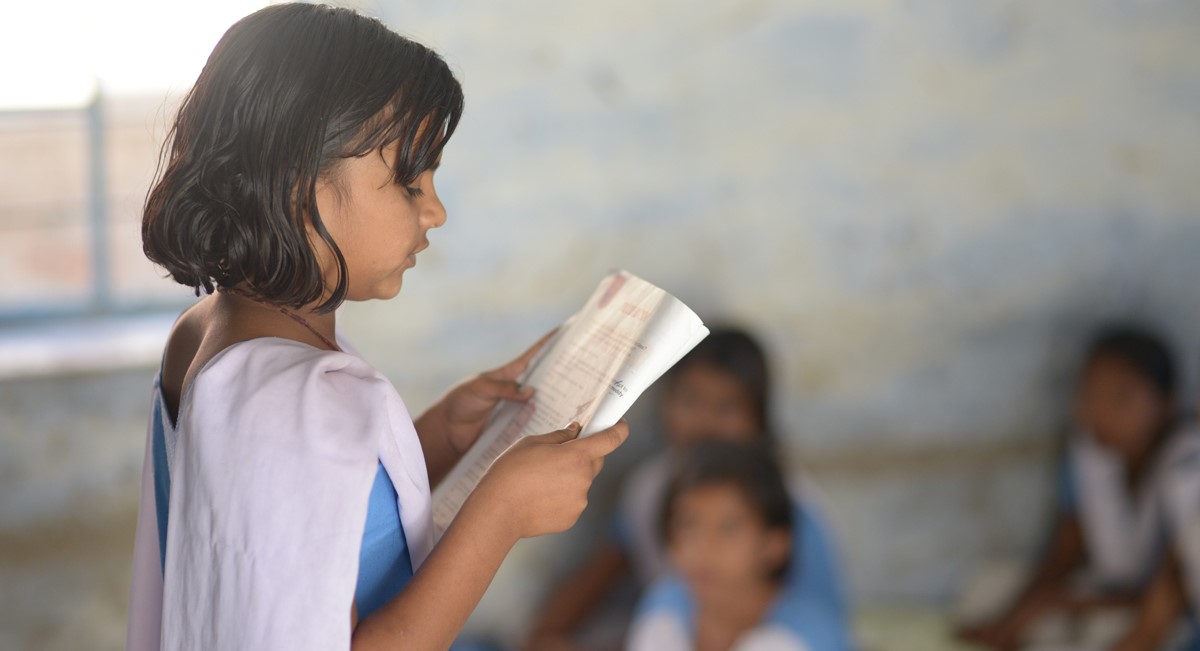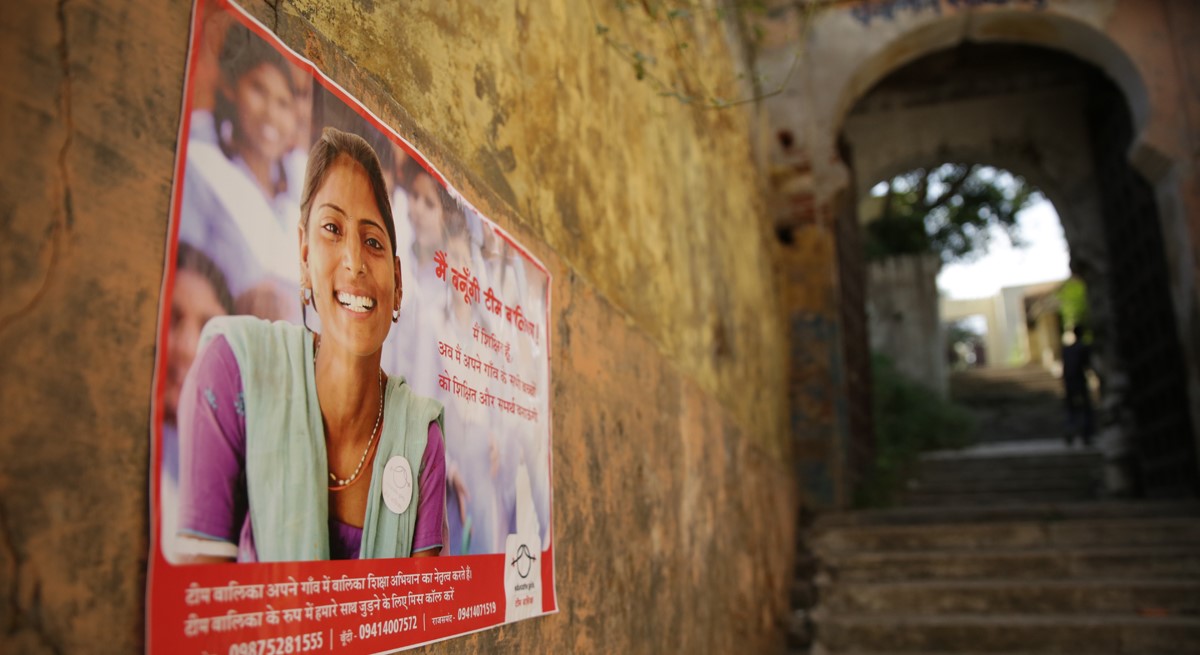Educate Girls Contributes To Harvard South Asian Institute And Tata Trusts Publication

Educate Girls was recently commissioned to write a policy recommendation that forms part of a wider piece of work as a collaborative partnership between The Tata Trusts and the Harvard South Asia Institute, looking at Educational, Social and Economic Empowerment of Women in India. Triggering Success: Innovative Interventions to Promote Educational Access in India was the resulting publication compiled by Jacqueline Bhabba and Anisha Gopi. It was launched in Delhi on 22 December 2016 and Educate Girls contributed the opening piece on girls’ education.
Read the full policy recommendation here.
Writing the piece enabled us to reflect on Educate Girls’ model and its success and allowed us to understand what parts of our programme could be adopted at scale by the Government of India.
A Summary of Our Recommendation
After nearly 10 years of community level work and enrolling over 150,000 girls into schools, Educate Girls has demonstrated that village level community workers (we call them Team Balika) can have a huge impact in their own community on educational access and attainment. Herein lies a cost effective and scalable policy initiative for State education departments to consider. Such a policy could help address the country’s teacher shortage, learning crisis and continuing issues around gender discrimination and inclusion, ensuring access, quality and equity.
Educate Girls recommends that State Education Departments provide a village level volunteer in every village in an Educationally Backward Block (EBB)1 to work as a teaching assistant alongside government school teachers and work at the community level to map and enroll out-of-school girls into school. We recommend that this programme could be funded through outcomes-based contracts with government funding committed to pay only when learning and enrollment outcomes are achieved – with targets set by a central body and results independently verified.

Essentially, we recommend that the State government could potentially only pay for success in the early stages of roll out. This approach could support State Education Departments in achieving results, and is particularly timely given the NITI Aayog and MHRD’s new proposal to rank States on their educational outcomes through the School Education Quality Index (SEQI)2. This new plan will encourage States to innovate to improve results with access and learning outcomes as key indicators.
The Educate Girls model depends on the recruitment, training and motivation of young people to give back to their own community and to champion the rights of girls, whilst building skills and gaining valuable work experience that will enable them to improve their own livelihood opportunities in the future. This approach provides the program with local cultural knowledge, community access, appropriate mentorship and regular intervention. By embedding the behavior change in the community, Educate Girls builds self-sufficiency and sustainability as it exits out of villages.
Although this model centres around a volunteer engagement at the village level there are of course costs involved in recruitment, training, performance management, mentorship, curriculum materials etc. but Educate Girls recommends that these costs could be paid for by State governments on a ‘pay for results basis’.
Karthik Muralidharan, Associate Professor in the Economics Department at University of California and Honorary Adviser, NITI Aayog states in a recent piece about results-based financing,: ‘Pivoting the focus of government to measuring outcomes and financially rewarding improved performance will increase the policy focus on outcomes, encourage States to innovate to improve them, and enable better identification and dissemination of cost-effective best practices across states.”3
Educate Girls is contributing to experimentation in this field through its Development Impact Bond4 and has evidence after one year of operating a pilot outcomes-based contract that outcome incentives can improve service delivery, performance management and the resulting outcomes for boys and girls. The Government of India could tender for education service providers, skilled in managing community level volunteers at scale, to provide Team Balika management and yet only pay for pre-agreed positive outcomes in enrolment and learning. The State government could commit to paying for girls enrolled and aggregate learning gains achieved each year and, through such an approach, would enable flexibility and innovation in delivery, learning about what works and at what cost.

Service providers would then manage the Team Balika Program and, if required, investors could provide upfront capital to the service providers if they are unable to take on the contracts with their own reserves or working capital, receiving their capital back from the government once outcomes have been independently verified.
Given that we now have a mere 14 years to achieve the ambitious Sustainable Development Goals, there is an imperative to re-think India’s approach to the delivery of education. Whether or not this globally recognized set of targets should be our motivation, there is no denying the fact that India is facing a learning crisis and a tragically backward and paralyzing culture of gender discrimination.
As Safeena Husain, Educate Girls’ founder, says, “For every year a girl is not educated, her prospect for a better future dims”.
If we want to reverse the trend in falling learning outcomes for children across India, we have to think differently, fund differently and move quickly. The economic, social and health benefits of educating girls are now indisputable. This is one of the wisest investments a government can make. In the search for a strategy to improve learning outcomes, Educate Girls would like to advocate that by educating a girl, you are educating a nation.
Alison Bukhari
UK Director, Educate Girls
1 An EBB status is designated on the basis of two criteria of Female Literacy Rate being below the national average of 46.13% and the Gender Gap in Literacy being above the national average of 21.59%.
2 Nanda, P.K. & Gupta, K. (2016). Govt plans to rank states on education. http://www.livemint.com/Education/o6akjSo2Y1loDHHmWUsH0J/Govt-plans-to-rank-states-on-education.html referring to the new proposal.
3 Muradliharan, K. (2016)..Ask for Results. http://indianexpress.com/article/opinion/columns/union-budget-2016-ask-for-results/
4 Educate Girls. (2016). A new finance model for international development. http://instiglio.org/educategirlsdib/
Educate Girls
Posted on March 7, 2017
Interested in contributing towards
educating girls?
Quick Links
Resources & More
Keep helping. Stay Updated.
Child Protection Policy | Privacy Policy | Terms of Use | Employee Login | IT Assets
Educate Girls is a project of Foundation To Educate Girls Globally (FEGG) | FEGG is registered in India under Section 8 of the Indian Companies Act, 2013.
© 2018 All rights reserved. Educate Girls.

